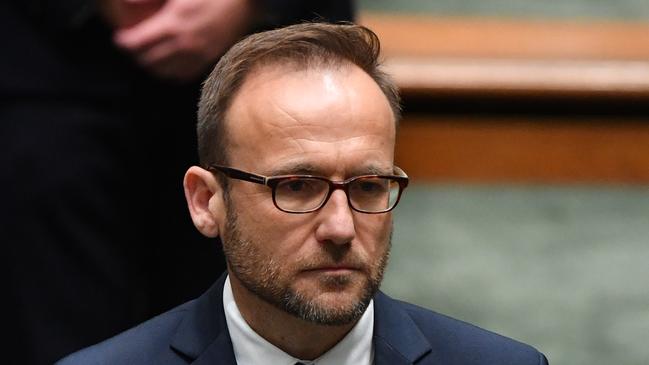Letter of intent: Adam Bandt bids to woo big business
New Greens leader Adam Bandt has made his first overture to Australia’s business community a week after accusing big business of ‘killing people’.

New Greens leader Adam Bandt has made his first overture to Australia’s business community a week after accusing big business of “killing people”, saying he wants to help industries avoid being “decimated by the climate emergency”.
In a letter to the CEOs of the Business Council of Australia, Minerals Council of Australia, Australian Chamber of Commerce and Industry and the Australian Industry Group on Tuesday, Mr Bandt said he was seeking their support for the party’s so-called “green new deal”.
The Greens were striving to be “in balance-of-power in both houses of parliament” after the next election, Mr Bandt said, as he outlined a five-point plan to transform Australia into a “renewable energy superpower and decarbonise our economy”.
“The benefits of this plan for your members far outweigh the costs to those handful of coal, oil and gas companies whose business model is premised on externalising destruction on a widespread scale,” Mr Bandt said.
“This language may seem harsh, but it is the reality, and the sooner it is confronted, the better for all of us. The transition out of fossil fuels is coming. The question is whether it happens as a series of unpredictable, disruptive shocks or as a successfully managed plan.”
Mr Bandt sparked a fierce response from Anthony Albanese and the mining industry after he declared “big business that makes its money by killing people and endangering people’s lives should be worried” in his first press conference as Greens leader.
He also claimed Scott Morrison’s climate change agenda would lead to “three times as many deaths” as the 33 people killed in the 2019-20 bushfire crisis.
The letter shows no sign of Mr Bandt moving away from that rhetoric. He said Australia was on track “for up to a catastrophic 3.4C of global warming” that would cause “economic upheaval on a scale never seen before”.
“We cannot allow Australian businesses to be decimated by the climate emergency,” he said.
Under the five-point plan, businesses would receive government assistance to “fuel-switch” from gas to electricity and tax concessions to drive growth in nonpolluting “smart” sectors of the economy, and see a boom in “clean infrastructure” as the electricity grid moves to 100 per cent renewables by 2030.
Coal, oil and gas would be phased out within a decade – though Mr Bandt insisted that would give investors and affected communities enough time to plan and find new jobs – and government would invest in renewables to drive down wholesale electricity prices for business and consumers.
“I want Australia to become a renewable energy superpower, where we export our sunlight and wind to the rest of the world via undersea cable, green hydrogen and ammonia,” Mr Bandt said.
“The science is both frightening and clear. There is no halfway house … We want to work with you to create an environment where business can flourish with cheap energy and government on its side. I urge you to be part of developing an agreed road map so that it can be implemented when the Greens are again in balance of power.”
The Australian revealed earlier this week the BCA, representing the nation’s biggest companies, had begun work on a new energy and climate policy that formally backs a price on carbon and net zero emissions for the economy by 2050.
MCA chief executive Tania Constable said the lobby group, which will soon release a climate action plan, supported continued action on climate change, Australia’s participation in the Paris Agreement and a technology-neutral transformation to a low emissions global economy.
“Accelerating investment in low emissions technologies such as carbon capture and storage and nuclear energy is crucial in meeting the Paris Agreement’s climate goals,” she said.
“Australian mining businesses are working together to make our contribution to lowering emissions, including reducing the emissions from minerals extraction and processing, investment in low emission technology, energy efficiency initiatives and increasing the use of renewable energy in operations. All sectors of the economy need to contribute to reducing emissions.”




To join the conversation, please log in. Don't have an account? Register
Join the conversation, you are commenting as Logout